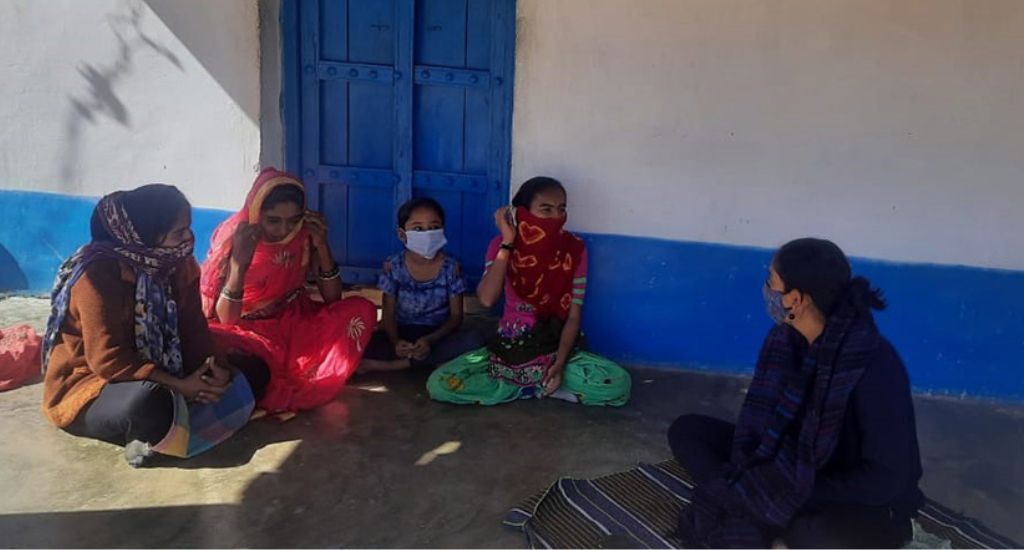
Good or bad to call women leaders ‘mahila sarpanch?’
Identifying women leaders by gender – like ‘mahila sarpanch’ – seems a step back, but one development worker sees it as acknowledging the challenges women overcame to become leaders.

Identifying women leaders by gender – like ‘mahila sarpanch’ – seems a step back, but one development worker sees it as acknowledging the challenges women overcame to become leaders.
While attending meetings, training sessions and interacting with local government representatives in the Kachchh district of Gujarat, I began to wonder… where were the women?
Of course there has long been the sarpanch pati (village leader husband), where the husband of an elected woman leader is the one who actually carries out her works. It is so common that it is shortened to SP.
But I was still trying to understand how this ecosystem worked — in its ideas, social structures and hierarchies.
The question of where the women are is not completely justified, for there are many exemplary women taking the lead in both urban and rural areas.
But my issue was that they are called mahila sarpanch (woman village leader).
Why?
Why should we attach gender to her occupation?
We don’t call a male leader the purush sarpanch (male village leader). So why not just say, “The sarpanch of Vadasar Gram Panchayat is exemplary.”
I began to realise that maybe acknowledging a woman’s triumphs over the odds stacked against them is an important first step?
It felt to me like a step back in the long struggle for equality, for women to be acknowledged as capable as men, if not more.
But then I began to realise that maybe acknowledging a woman’s triumphs over the odds stacked against them is an important first step?
Maybe being known as a mahila sarpanch is a way to reclaim their struggle of making a place for themselves in an otherwise male-upper-class dominated space?

But what emerges is also what we interpret as most important in our own hierarchy of discriminations.
For me it is gender.
People who have faced class, caste-based or religious discrimination may see those as the worst. This is not to say that anyone is below or above the other but a matter of accepting different perspectives.
So I wanted to know, is there an equal number of male and female ward members? Are enough women being written about? Does the panchayat I am writing about conduct the mahila sabha – as mandated by the Government of Gujarat in 2013 – so that the women can discuss issues that they perhaps cannot bring up in the gram sabha?
(READ: Where are women in local government?)
In search of these questions, I went on to meet inspiring women and young girls.
From one sarpanch who ensured that a single migrant reached her home in Kolkata during the Covid lockdown to another who gave her home to be used as a workshop for stitching masks – there are endless stories, where the women exhibit qualities one looks for in leaders.
Yet, there are instances where not a single woman was participating in the meeting or training of the mandated Social Justice Committee that is meant to ensure inclusion of the socially weaker sections of society. This mandates a woman member from an SC/ST community be a part of the 3-5 member committee.

While the inclusion of women may seem like a necessity, given what is described as social justice, it is seldom carried out, keeping in tandem with social traditions and cultures, each unique across the terrain of Kachchh.
While there are mandates on paper, they hardly get translated into action.
The reason depends on the medium through which awareness is created, involvement of the local people and community relationships.
The organisations that work with the community respectfully and with determination and an understanding of the fact that processes take time have brought about some great changes.

It requires building immense trust to talk to women, let alone invite them for a mahila sabha.
It takes years to convince families about inclusive meetings that have both young girls and boys, which the elders may not have experienced or understand completely.
But when such effort is made, one can expect a young woman to contest the municipality elections in Bhuj, or a girl from an adolescents’ meeting to say that she wants to reappear for her Class X board exams and eventually go for civil services.
Perhaps these small changes I’ve come across and shared are the first steps that should be acknowledged.
Because change takes time.
Every small step already achieved is taken as a given, as a baseline, and worked on to achieve the next milestone.
You cannot expect to see equal representation at every meeting or for every second or third sarpanch to be a woman.
Heavy words such as ‘intervention’ and ‘capacity building’ may not make much sense initially, but will have an impact in a few years.
When another outsider, like me, witnesses more than one woman attending a training session, they might wonder why the women aren’t chairing the committee.
That is the idea, though.
That every small step already achieved is taken as a given, as a baseline, and worked on to achieve the next milestone.
Because, after all, perspectives, goals and even policies (like the idea of a mahila sabha) realign themselves every now and then, especially when it comes to gender and local governance.
The lead image shows how organisations work to build trust with local women, often for years, to encourage them to be more active in local governance (Photo courtesy Team Setu Abhiyan)
Shefali Gupta is an India Fellow (2020) who worked on documenting best practices and executing field research to fuel advocacy within local governance. She now leads Nijaswa, her own social enterprise, with artisans of Odisha.